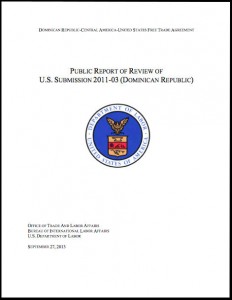by Cassandra Waters. Originally posted at AFL-CIO Now
 On Friday, the U.S. Department of Labor (DOL) released a report in response to a complaint brought under the free trade agreement between the United States and the Dominican Republic, known as the Central America Free Trade Agreement–Dominican Republic (CAFTA–DR), which detailed severe worker abuse on sugar plantations. The vast majority of sugar workers are Haitian or of Haitian descent. Most are undocumented, leaving them particularly vulnerable to extreme exploitation. The DOL’s report confirms ongoing, systematic abuses, including the use of child and forced labor; hazardous working conditions; wage theft; denial of medical, pension and other benefits if the worker is undocumented; routine violations of minimum wage and overtime rules; and retaliatory firings against union activists and workers who attempt to mount legal challenges against their employer. Unfortunately, this is not news to anyone familiar with the issue—the industry has been under fire for decades and has been the subject of multiple studies and media reports.
On Friday, the U.S. Department of Labor (DOL) released a report in response to a complaint brought under the free trade agreement between the United States and the Dominican Republic, known as the Central America Free Trade Agreement–Dominican Republic (CAFTA–DR), which detailed severe worker abuse on sugar plantations. The vast majority of sugar workers are Haitian or of Haitian descent. Most are undocumented, leaving them particularly vulnerable to extreme exploitation. The DOL’s report confirms ongoing, systematic abuses, including the use of child and forced labor; hazardous working conditions; wage theft; denial of medical, pension and other benefits if the worker is undocumented; routine violations of minimum wage and overtime rules; and retaliatory firings against union activists and workers who attempt to mount legal challenges against their employer. Unfortunately, this is not news to anyone familiar with the issue—the industry has been under fire for decades and has been the subject of multiple studies and media reports.
The DOL has announced a four-year project aimed at reducing child labor, improving working conditions and enhancing the capacity of the Dominican government to enforce domestic labor law. While this is a welcome effort, the deplorable conditions sugar industry workers face cannot be rigorously addressed without confronting the much broader problem of migrant workers’ rights in the Dominican Republic. Further, it calls into question how seriously the U.S. government takes labor commitments under CAFTA–DR when the government of the Dominican Republic has racked up such a prolonged history of failure to ensure that workers are free from the most egregious forms of abuse without any trade repercussions.
Unfortunately, Dominican policies routinely discriminate against migrant workers and individuals of Haitian descent in ways that exacerbate workers’ vulnerability. Many sugar sector workers lack legal documentation or passports and even birth certificates. This restricts movement, invites employer manipulation and makes it difficult or impossible to find alternative employment. Dominican immigration policy escalates the problem rather than addressing it. The DOL’s report comes on the heels of a decision by the Dominican Constitutional Tribunal, upholding a provision of the 2010 Constitution that denies citizenship to children of undocumented immigrants, even those born in the country. The Central Electoral Board, the entity charged with issuing national identification documents, plans to review about 16,000 individuals born in the Dominican Republic to determine whether they should be stripped of their citizenship. The government already routinely denies Dominicans of Haitian descent access to identity documents and seems intent on dramatically increasing the number of stateless individuals in the coming months. This systematic disenfranchisement forces workers into low-paid, dangerous employment with few legal protections to guard against abuse.
 Sugar sector workers are often reluctant to file complaints regarding labor abuses due to fear of retaliation. In addition to discriminatory policies, the government periodically engages in forced, violent deportation of Haitian immigrants. Employers in the sugar sector take advantage of workers’ precarious legal status and the fear it engenders. The DOL report notes that some have threatened to report workers to immigration authorities to ensure compliance. Under these circumstances, it is unsurprising that working conditions on sugar plantations have not improved despite prolonged international scrutiny.
Sugar sector workers are often reluctant to file complaints regarding labor abuses due to fear of retaliation. In addition to discriminatory policies, the government periodically engages in forced, violent deportation of Haitian immigrants. Employers in the sugar sector take advantage of workers’ precarious legal status and the fear it engenders. The DOL report notes that some have threatened to report workers to immigration authorities to ensure compliance. Under these circumstances, it is unsurprising that working conditions on sugar plantations have not improved despite prolonged international scrutiny.
Every year, the United States buys 200,000 tons of sugar from Dominican growers. Under the free trade agreement, both countries are charged with “striving to ensure” workers are afforded fundamental labor rights as a condition of continued preferential trading status. They also must be sure to enforce their own labor laws so that “rights” are not just hypothetical. Conditions in the sugar sector have been notably terrible for decades, and the current program to address child labor is an important first step but does not address the need for concrete enforcement mechanisms for broader workers’ rights protections.
